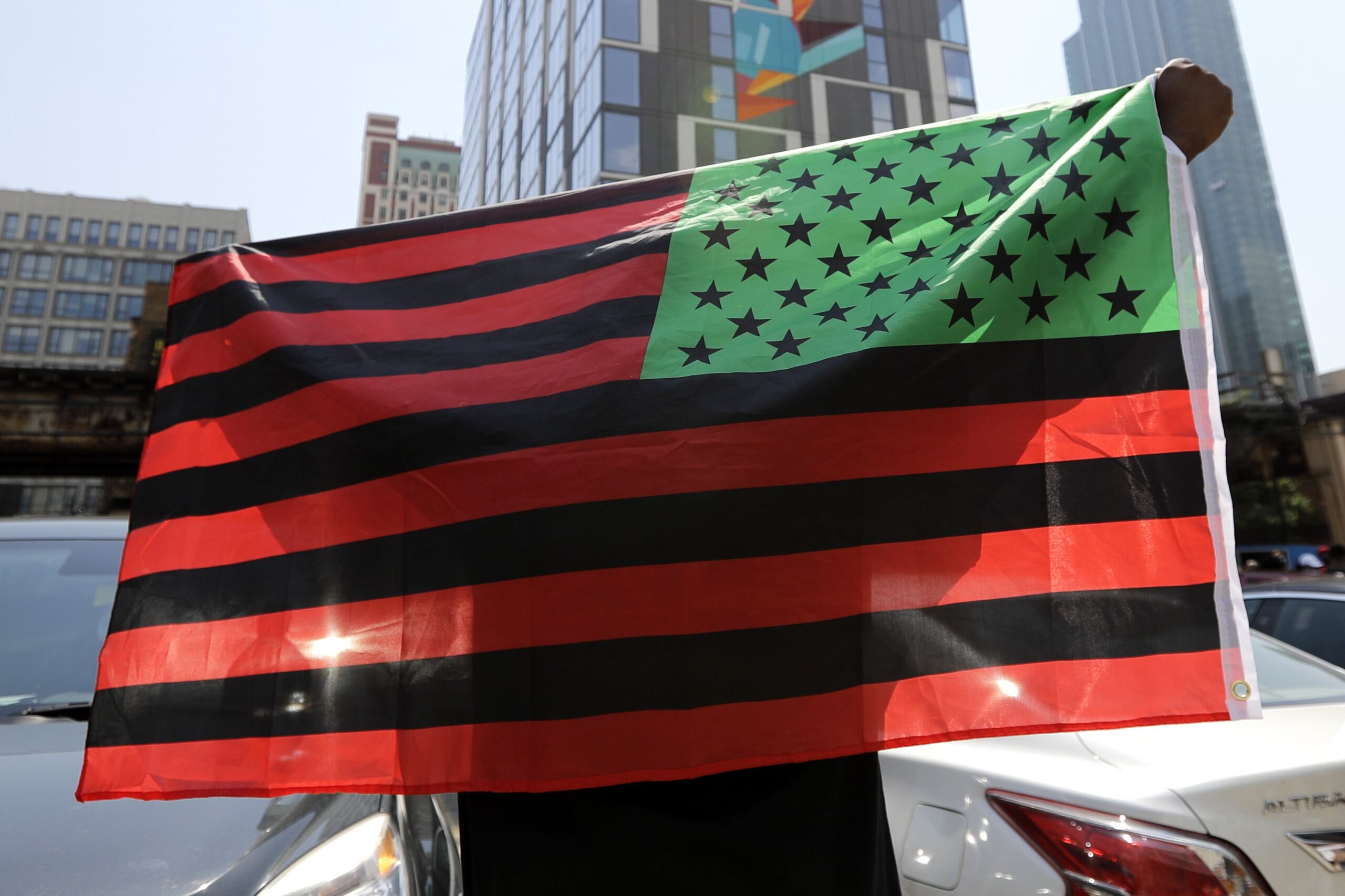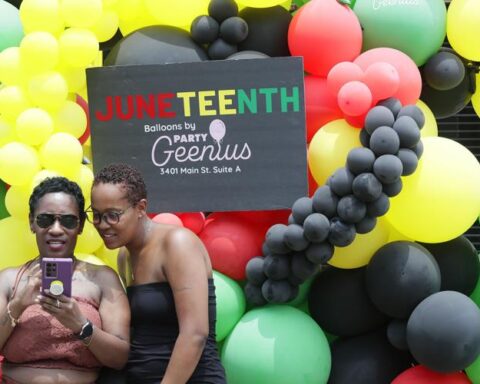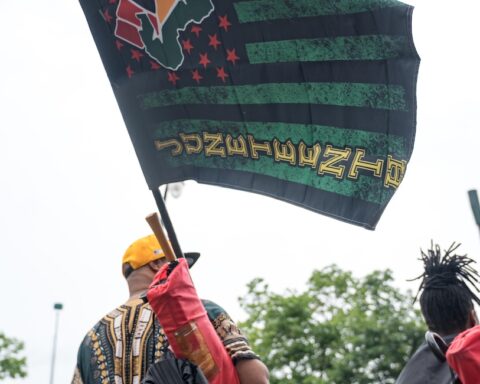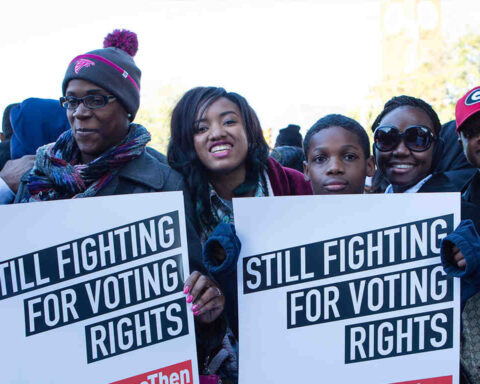By Michelle Garcia
“Companies that are having these picnics for their employees and feeding them fried chicken and watermelon — who made that call?” Torrina Harris of Galveston, Texas, quipped.
“For Black folks, there has been a long tradition of commemorating Juneteenth,” said Amara Enyia, policy and research coordinator at Movement for Black Lives.
But now that Juneteenth is a federal holiday, complete with offices and schools closing in recognition of it, the inevitable has also taken shape: commercialism.
Box stores from coast to coast are lining shelves with Juneteenth products. Walmart caught the most flack recently for stocking a Juneteenth Great Value brand ice cream flavor, the label touting a trademark symbol. The move prompted questions about who can even own the idea of Juneteenth, and the appropriateness of corporations cashing in on what could be considered a bittersweet holiday, commemorating the end of enslavement and the beginning of a generations-long struggle for civil rights.
‘We cannot, at this stage, afford symbolism’
In Galveston, Texas, the home of Juneteenth, residents began marking the day when members of the Union Army arrived upon the southern reaches of Texas in 1865 to both inform enslaved people that they were henceforth entitled to a wage for their labor, and to enforce the Emancipation Proclamation among slaveholders. Black people have led their own celebrations for the holiday since its inception. Their celebrations have since reached everywhere the Black diaspora has spread.
Juneteenth’s popularity has waxed and waned over the decades, but was thrust back into the public interest with racial justice movements demanding more political capital, especially in the aftermath of George Floyd’s murder in 2020. Last year, President Joe Biden signed legislation to make Juneteenth a federal holiday, answering the calls from Black activists.
This year, some attempts to celebrate the day have gone sour, very publicly. Many were angry to see the trademarked Juneteenth ice cream on shelves, developed with the help of a corporation that creates artificial flavors, and a children’s museum apologized after its Juneteenth menu included a watermelon salad. A Juneteenth soul food celebration in Alabama was canceled after a leaked poster for the event revealed none of its featured hosts were Black.
“Companies that are having these picnics for their employees and feeding them fried chicken and watermelon — who made that call?” Torrina Harris of Galveston quipped.
Ultimately, said Enyia, “it is a testament to this country and the way our systems are set up to where the automatic knee-jerk default or response is profit-making or profit-seeking.”
The impulse, when it comes to many holidays, is to focus more on the “bright side” — in this case, emancipation, freedom — which lends itself to digestible celebrations and commemorative products. Doing so brushes aside the thing Black people were being emancipated from: centuries of slavery. But, Enyia said, the inherent nature of the holiday is also “a reminder of how this country has treated Black people. It’s a reminder of the history of this country.”
Angela Tate, a curator at the National Museum of African American History and Culture, points out that throughout all the generations of Juneteenth community-led celebrations, which have taken place in big cities, small towns and rural communities, Black people have tended to pair the bitter and the sweet.
“African Americans have always used these moments of memory to think about where the community has come from and what we’re pursuing and striving toward, as well as taking the time to pass down history and culture,” she said last year. “Juneteenth is a moment to think about freedom being conditional freedom and it is something that we must continuously strive and fight for.”
But major companies looking for a way to participate in Juneteenth celebrations “do not understand or are not interested in addressing the substantive issues that these holidays — this holiday in particular — can shed light on,” Enyia said.
Harris, a board member of Vision Galveston, which sponsors the city’s Juneteenth festivities, agreed that celebrating Juneteenth should go much deeper than ticking off a box.
Getting involved in organizing a Juneteenth celebration or presenting a product should also prompt questions like, “Are you actually giving decision-making power that also influences how funds are distributed? Are you giving decision making power to people who are representative of the community that this holiday is meant to honor?”
In the same way that LGBTQ Pride Month has become synonymous with rainbow flags throughout the month of June as advocates continue to demand equity and action for queer people, Enyia draws similar parallels for companies eyeing Juneteenth.
“We cannot, at this stage, afford symbolism,” she said.
Celebrating Juneteenth, past and present
Historically, local communities created their own stages for celebrating Juneteenth. In some places, afternoon-long festivals with food and music would be paired with readings of African American poetry, and readings of seminal speeches from Black leaders like W.E.B. Du Bois and Frederick Douglass.
The 2020 documentary “Miss Juneteenth” illustrated the joyous ways Black communities celebrate themselves each year.
Now that it’s a federal holiday, part of figuring out how to mark the day as a nation comes with educating the public about it. More Americans say they have at least some knowledge about Juneteenth than they did last year, according to a Gallup poll published Thursday. Eleven percent of respondents said they knew nothing at all about Juneteenth this year compared with 28% last year, despite 45 states and Washington, D.C., having had some formal recognition of Juneteenth before Biden signed the bill into law.
With greater understanding has also come more support for recognition: This year, 45% of respondents said they thought Juneteenth should be a federal holiday, and 25% said they were not sure or were unfamiliar with Juneteenth. That’s compared with 35% who last year said it should be a federal holiday, and 40% who said they were not sure or unfamiliar with the holiday. And despite many of the laws that have swept through states restricting race-conscious education, 63% said they supported making Juneteenth part of history curriculums in public schools, up from 49% last year.
The shifting tide is exactly what Opal Lee, who has long lobbied for federal recognition of Juneteenth as a holiday, has been working toward for decades. Still, she warned against resting “on our laurels,” she told D magazine. “There is still work to be done. Our educational system doesn’t tell the truth and we need the truth told.”
Lee is one of many activists and organizers who say Juneteenth is not only for celebration but for action. A coalition of organizations are demanding that Biden create a federal commission by executive order to study reparations and the long-term effects of slavery. Enyia, of the Movement for Black Lives, said that action is especially important for bolstering policies that will benefit Black people and contribute toward their liberation — whether it’s overhauling policing and public safety on a local and federal level or policies that would expand economic opportunities like student loan forgiveness.
For Lee, who has spent much of her 95 years marching on roads across the country to advocate for Juneteenth as its own federal holiday, Juneteenth is a moment for work, but it’s also a moment for all Americans to celebrate their liberties.
“It’s important that people recognize it is not a Black thing, that it’s not just a Texas thing, but that it’s about freedom for everybody — and we’re not free yet.”





